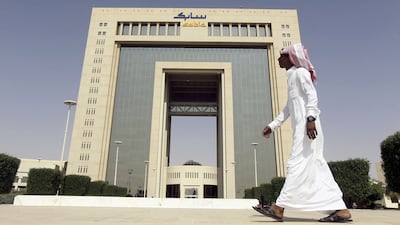Saudi Basic Industries Corporation (Sabic), the Middle East's biggest petrochemicals company, swung to a loss in the third quarter on lower revenue caused by weak demand for global petrochemical products, as well as non-cash losses from a new deal with the Public Investment Fund.
The company reported a net loss of 2.88 billion Saudi riyals ($768 million) in the three months to the end of September, compared with a net profit of 1.84 billion riyals during the same period last year, it said on Thursday in a filing to the Tadawul stock exchange, where its shares are traded.
Revenue for the period fell by nearly 17 per cent, year on year, to about 36 billion riyals.
The company said it incurred non-cash losses amounting to 2.93 billion riyals during the quarter as a result of the PIF's acquisition of Sabic’s entire stake in the Saudi Iron and Steel Company, better know as Hadeed.
“Despite the global weak demand for chemicals, Sabic managed to increase sales volume by 7 per cent with improvement in earnings before interest, taxes, depreciation, and amortisation margin for this quarter,” its chief executive Abdulrahman Al-Fageeh said.
He also said the Hadeed transaction was a strategic one and would “help Sabic to realise its strategic goals to become the preferred world leader in chemicals”.
The average selling price of petrochemicals products globally declined by 5 per cent, quarter on quarter, while prices for agri-nutrient products increased by 11 per cent, the company said.
In the nine months period to the end of September, the company reported a net loss of one billion riyals, compared to a profit of 16.2 billion riyals, as revenue slumped about 26 per cent annually to 106.5 billion riyals.
The company plans to spend between $3.5 billion and $3.8 billion in 2023.
Sabic is playing a key role in Saudi Arabia's plan to reduce its reliance on oil exports.
Last year, the company announced plans to set up a plant to convert crude oil into petrochemicals in Ras Al Khair, with a capacity of 400,000 barrels per day.
In December, Sabic signed an agreement with Oman’s state energy company OQ and Kuwait Petroleum International to set up a petrochemical complex in the sultanate.
Earlier this year, the company, in partnership with the China Petroleum and Chemical Corporation, better Sinopec, also started the commercial operation of their new polycarbonate plant in Tianjin, China.
The new production centre is situated within the Sinopec-Sabic-Tianjin Petrochemical complex jointly owned by Sabic and Sinopec.


